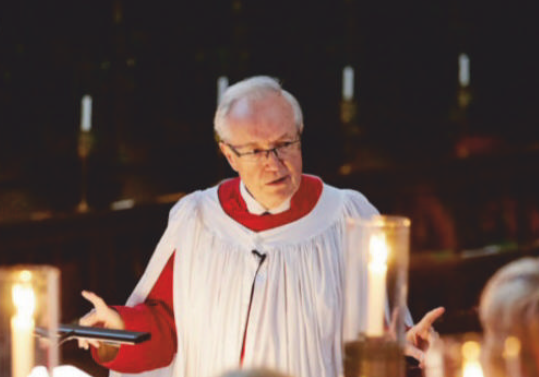Under him the carol service became more ecumenical and open. It had more Latin, like the weekly services, which now featured Latin masses and canticles. His Anglican suspicion of the Roman church had been soothed, when he was really quite young, by singing an especially wonderful melody in Verdi's "Te Deum", and later by the beauty, which he thought inexpressible, of Gregorian chant.
在斯蒂芬·克劳伯里的领导下,颂歌变得更加普世和开放。颂歌中有了更多的拉丁语,就像每周的礼拜一样,现在以拉丁语弥撒和圣歌为特色。他在很小的时候就通过在威尔第的"赞美颂"中演唱一段特别美妙的旋律,以及后来的他认为无法表达的格里高利圣咏的美打消了英国国教会对罗马教会的怀疑。
In 1979 he became master of music at Westminster Cathedral, falling deeply in love with the rhythms of the Catholic liturgy. The singing of Latin brought purer vowels into the King's sound, which was pleasing. So too did singing carols in other languages, including Latvian and Church Slavonic. This tested the singers, and made them more expert musicians. It also reminded them—if they needed reminding, with worldwide tours, frequent recording sessions and televised broadcasts of the carol service all over America—that their singing now spanned the globe.
1979年,斯蒂芬·克劳伯里成为威斯敏斯特大教堂的音乐大师,深深爱上了天主教礼拜仪式的节奏。拉丁语的歌唱给国王的声音带来了更纯正的元音,这是令人愉快的。 用其他语言唱圣诞颂歌也是如此,包括拉脱维亚语和教会斯拉夫语。这对歌手进行了测试,使他们成为更专业的音乐家。这也提醒了他们-如果他们需要的话,通过世界各地的旅游,美国各地频繁的录制和电视广播颂歌仪式——他们的歌声现在遍及全球。

Like his immediate predecessors, he wrote new descants to freshen up the well-known hymns. His most daring innovation, though, was to commission a new carol every year. A lot of new church music was not of very high quality, and he wished to show that fine composers were still willing to write for liturgical settings. Lennox Berkeley, Arvo Part and John Tavener all wrote one, and he regretted not asking John Adams, since no one said no.
像他的前辈一样,他创作了新的圣歌来更新著名的赞美诗。但是,斯蒂芬·克劳伯里最大胆的创新是是每年委托制作一个新的颂歌。很多的教堂音乐质量都不是很高,斯蒂芬·克劳伯里希望表明,优秀的作曲家仍然愿意为宗教仪式创作。伦诺克斯·伯克利、阿沃部分和约翰·塔文纳都创作了一首颂歌,他后悔没有邀请约翰·亚当斯,因为没有人说不。
译文由可可原创,仅供学习交流使用,未经许可请勿转载。












